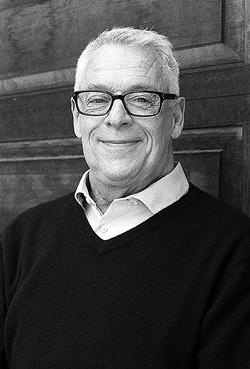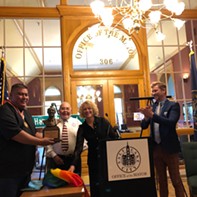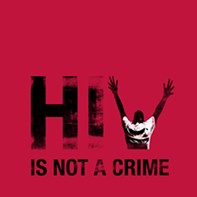LGBTQ-rights pioneer Cleve Jones on the new frontier of gay rights
By Dylan Woolf Harris @dylantheharrisBreakthroughs for LGBTQ rights wouldn't be possible without those who put themselves on the line, such as author and activist Cleve Jones. A close friend to renowned gay-rights pioneer Harvey Milk, the first openly gay elected officeholder in California who was assassinated in 1978, Jones to this day continues to be a champion for the LGBTQ community. He will be the keynote speaker for Equality Utah's annual PAC brunch, which is 10 a.m. Saturday at the Red Butte Garden Orangerie.
There has been a lot of progress from LGBTQ rights, what do you see as the next frontier in that movement?
I think our next task is to defend the rights that we've won and the advances that we've made—the protection against job discrimination and, of course, the right to marry. So far, [President Donald] Trump has not moved to roll anything back but clearly his closest advisors want him to do that.
There are plenty of people who want to fight for change or bolster some of the progress that has been made, but they might not know how to channel some of these feelings. Do you have any advice for people who feel this way?
I think everyone can find a way to contribute. Really, people like to argue about which tactics are the most effective. In my view, they all work. We need to vote. We need to march. We need to write letters to the editor. We need to engage our fellow citizens in conversation. It's a very critical time in our history.
Speaking of that, we're going to have a new member of the U.S. Supreme Court. How do you think Judge Neil Gorsuch, if confirmed, will impact LGBTQ rights?
We might end up with a very conservative Supreme Court for a very long time. If that is the case, then I think we might see a reversal of some of the progress that we've made. I think it's very important for people to speak out against some of these nominations. Not just the Supreme Court, but some of his cabinet nominations. Some of them are quite appalling.
Years ago, you were involved in grass-roots demonstrations. How would you compare recent movements, such as the Women's March?
To me, it is reminiscent of the Vietnam Era. The size of the protests are close to what we saw with the anti-war movement in the late 1960s and early 1970s.
You're also involved in raising HIV awareness. What are some stigmas that you hope to dispel?
The stigma against HIV and people living with HIV is really a part of the problem of new infections because young people are very aware of the stigma that makes them less likely to get tested, less likely to speak openly with their peers. So we have to understand that today we have the tools to end HIV through treatment. Treatment equals preventions. HIV-positive people who are being successfully treated can no longer transmit the disease, and HIV-negative people with the one-pill-a-day regimen can prevent themselves from getting the disease. We know how to do it, but the stigma surrounding the disease is part of our challenge.
What can you tell us about your book When We Rise: My Life in the Movement?
This is the story of my own life within the movement. I'm very pleased with the way people are responding to it. It's not a history book; it's a memoir and the partial inspiration for the ABC miniseries of the same name that's coming out at the end of this month.
Are you looking forward to visiting Utah?
I've traveled extensively in Utah with the AIDS Memorial Quilt back in the day, and met many very kind people. I'm looking forward to this visit in Salt Lake City, I have many friends there. And I look forward to returning.
More by Dylan Woolf Harris
-
Dabakis Is Leaving the Building
Ever boisterous and outspoken, state senator says lending liberal voice trumps his bill tally.
- Apr 4, 2018
-
Gagged and Bound
Row between South Salt Lake and muralist gets the burlesque treatment.
- Mar 21, 2018
-
Inland Port Authority Update
Gov. Herbert signs contested bill into law.
- Mar 16, 2018
- More »







